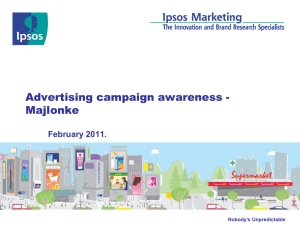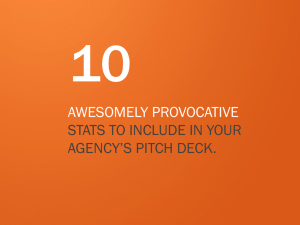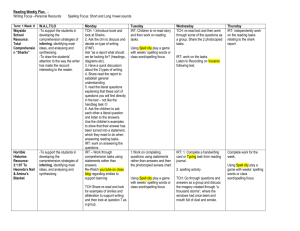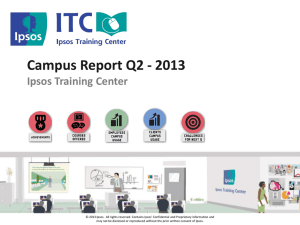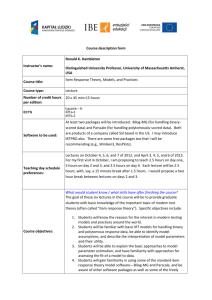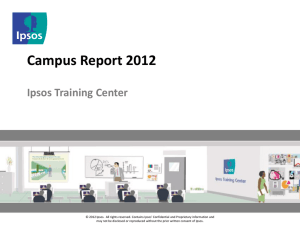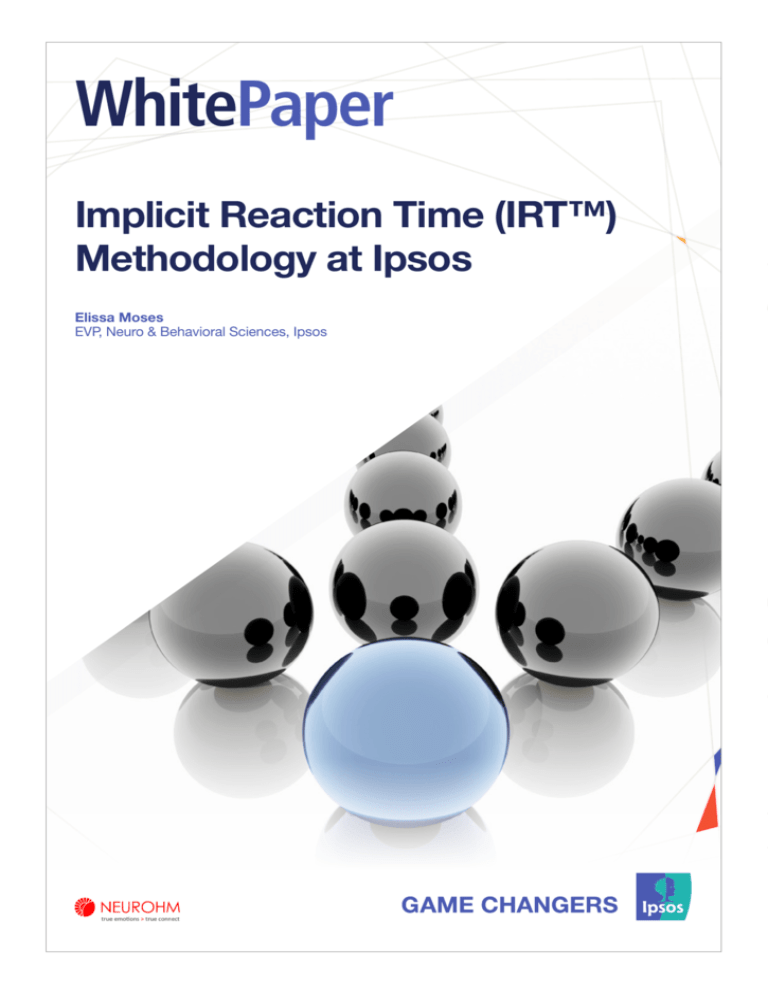
WhitePaper
Implicit Reaction Time (IRT™)
Methodology at Ipsos
Elissa Moses
EVP, Neuro & Behavioral Sciences, Ipsos
I M P L I C I T R E AC T I O N T I M E ( I R T ™ ) M E T H O D O LO GY AT I P S O S
Background
Implicit Reaction Time is a well-established methodology that is used internationally
by academia and market research alike to determine the unconscious strength of
associations. Ipsos calls their advanced version of this method IRT™.
It relies upon the measured response time to questions of association in milliseconds.
This applies to brands and their attributes, products and benefits, political candidates
and possible virtues and any object or entity and the characteristics potentially
ascribed. Moreover, IRT™ can determine the strength of conviction people have to
state intentions such as intent to buy, vote, try, use, discuss, etc.
The fundamental psychological principle behind IRT™ is that the brain holds an
intricate network of neural associations that are based on our personal perceptions
and experiences. The closer associations are, such as Apple and the attribute
“innovative”, the faster we respond to acknowledge them using IRT™. It is the same
fast certainty as recognizing a loved one as they walk into a room vs. seeing a stranger
or acquaintance at a party. If you are asked to confirm your gender or name, there is
likely to be a very fast response. You are certain and you have conviction. But if asked
if a restaurant is good, if you enjoyed your vacation or if even a product you are using
is preferred, you may be conflicted between how you want to answer and how you
really feel and this results in a longer time to answer.
What makes IRT™ so remarkable is that it enables us to capture the strength of nonconscious associations when we are conflicted, have feelings we are unaware of, or
when our inclination is to give polite, socially acceptable responses.
About Ipsos IRT™ Testing
The Ipsos next generation IRT™ method is a flexible and insightful method designed
to uncover incongruence in what is reported and what is actually felt. It is supported
by highly refined algorithms that calibrate individual response speeds and eliminate
biasing variables. Specifically, Ipsos IRT™ normalizes for a range of possible individually
driven differences including:
• Motor skills (driven by age, computer familiarity, etc.)
• Computer processor and Internet connection speeds
• Speed of learning, fatigue, etc.
These advancements in normalization drive global application and scalability and the
questioning method provides greater consumer comfort. Ipsos has also developed
IRT™ based norms, with further development in the works to establish attribute and
category specific norms. Moreover IRT™ is effective as a module embedded within
surveys for providing a seamless integrated perspective on both conscious and
unconscious aspects of consumer response. With this flexibility, IRT™ is integrated
seamlessly into advertising and brand testing, product testing, package testing,
consumer segmentation and innovation.
2
Copyright© 2015 Ipsos. All rights reserved.
I M P L I C I T R E AC T I O N T I M E ( I R T ™ ) M E T H O D O LO GY AT I P S O S
Implicit Association/IRT™ History
The advanced IRT™ method that Ipsos uses most often is an evolved tool based on
the first Implicit Association techniques developed by Professor Anthony Greenwald
of Washington University and Professor Mahzarin Banaji of Harvard University.
These methods were initiated in the late 90’s and resulted in widely published work
exploring unconscious racial bias among New York policemen.
The founder of the Ipsos IRT™ partner company Neurohm, Professor Rafal Ohme, was
a young post doctorate studying in the USA at Stanford during that time and had the
fortunate opportunity to assist in some of the original trials of the technique working
with Professors Greenwald and Banaji. This provided Dr. Ohme with an early firsthand
foundational understanding of the core principles of Implicit Association. When he
returned to his country, Poland, Dr. Ohme became both a professor and an entrepreneur
founding Neurohm, a pioneering company in the application of nonconscious
measurement tools including Implicit Association, EEG and Biometrics. This made Dr.
Ohme one of, if not the first, to offer Implicit Association applications to the market
research industry.
With such early and abundant experience, Neurohm was able to advance the technique
to be better suited for consumer research applications making it the reliable,
streamlined and scalable tool it has become today.
What Makes Ipsos/Neurohm IRT™ Most Advanced?
Ipsos/Neurohm IRT™ has the following unique benefits:
1.Our IRT™ utilizes custom algorithms to reduce noise and enhance the
accuracy of the data. This starts with taking base measurements of each
respondent and calibrating the range and mean of expected reaction times for
each individual. Ipsos has created meaningful calibration exercises customized
to countries throughout the globe. Armed with this knowledge, we can eliminate
responses which are aberrant such as taking too long (suggesting a distraction
or interruption) or showing no range (suggesting that the respondent may have
been disengaged or mindlessly responding to get through a survey). As with most
neuro tools, Ipsos oversamples about 20% to enable standards for sample quality.
2. The algorithms consider meaningful respondent and study characteristics
including syllable and word length of each attribute (longer attributes take longer
to process), computer processing speed, etc. that increase the accuracy and
clarity of the data.
3.The focus of analysis is based upon the aggregated changes in reaction
times calibrated to each individual’s base line profile – so individual differences
in average response time do not bias results.
IRT™ was co-evolved by Ipsos and Neurohm to be practical and scalable for
integrating into all sorts of research surveys. The earlier versions of Implicit
Association required multiple repetitions of attribute ratings and paired
comparisons. Our evolved IRT™ approach eliminates both the need for repetition
and paired comparisons so that each ad, product, fragrance, concept, brand,
candidate, etc. can be evaluated in the absolute.
3
Copyright© 2015 Ipsos. All rights reserved.
I M P L I C I T R E AC T I O N T I M E ( I R T ™ ) M E T H O D O LO GY AT I P S O S
4. IRT™ has been validated for test-retest reliability and continues to evolve as
we gain vast experience with new types of applications and conduct R&D.
For instance, Ipsos conducted meta-analyses on individual attributes and found
that ranges of response can vary significantly depending on the attribute.
For example a concrete descriptor such as “quality” may behave differently than
a personal judgment such as “for me”. This has led Ipsos to standardize a battery
of key attributes and begin the process of developing individual attribute norms.
However, custom attributes are also encouraged on a category or brand basis.
Additionally, meta-analyses have established the unique difference between top
box ratings and fast time response.
Ipsos and Neurohm offer two types of applications. In order to be able to use
traditional 5-point scales and calibrate them for conviction, Ipsos/Neurohm
co-developed the U-Scale™ which enables respondents to rate attributes on a
5-point scale without position bias (See Figure 1). Having this degree of granularity
also enables us to conduct higher level analytics such as regression and
correlation analyses. Also, it should be noted that the attribute is usually placed
right above the scale and that each ad, product, brand logo, etc. is positioned
above the attribute as the object of evaluation.
Figure 1
For product, fragrance and package testing where relative preference is often
the focus, Ipsos leverages variations of a traditional 2-point scale as shown in
Figure 2. With IRT™, pictures and logos, as well as words (i.e., product tried
first/product tried second), can be used as the entity being evaluated or the
choice of preference in context of an attribute.
Figure 2
4
Copyright© 2015 Ipsos. All rights reserved.
I M P L I C I T R E AC T I O N T I M E ( I R T ™ ) M E T H O D O LO GY AT I P S O S
How IRT™ Works
There are a few simple steps in designing and setting up an IRT™study at Ipsos.
• First it is important to consider the objectives of the study and if the assessment
is to compare the attribute profile of multiple stimuli or to examine the potential
impact of a stimuli using a pre/post framework.
This may impact which scale we recommend and the need for a control or
pre-exercise.
• Next we discuss and agree on the appropriate attributes of interest, sample size
and definition, etc.
• Finally we discuss the IRT™ placement within the context and design of a larger
study if indicated.
Ipsos employs IRT™ in both experimental and non-experimental designs, based on
the stimuli type and client objectives. The tool is well applied when assessing emotional
and attitudinal territories. However, the method can effectively indicate how much one
brand owns functional attributes vs. another and signal potential growth or erosion in
this regard. Further, IRT™ enables respondents to respond automatically, before
cognitive processing sets in and, as such, attributes evaluated within the system should
be simple, easy to understand and brief. In other words attributes need to be instantly
clear and not require thought or consideration to assess.
5
Copyright© 2015 Ipsos. All rights reserved.
I M P L I C I T R E AC T I O N T I M E ( I R T ™ ) M E T H O D O LO GY AT I P S O S
When & How Best To Use IRT™
Ipsos IRT™ serves as a barometer for consumer commitment
by providing granularity in the composition of rating scores.
By decomposing “traditional” respondent ratings into two
groups, Marketers will learn if attributes and associations are
truly owned by a brand, product or person or if consumers
are expressing doubt or possible lip service and vulnerability
exists. The response patterns are:
• Explicit Yes %: traditional explicit agreement rating
level (e.g., top 2 box score, % yes, etc.)
Explicit Yes:
(%)
Uncommitted
Yes (%)
• Uncommitted Yes %: Comprised of respondents
who agreed but responded with a slow or average
response time. The higher the value, the more
vulnerable the association.
• Emphatic Conviction %: Comprised of respondents
who agreed and responded with a quick reaction time.
The higher the value, the more widely and strongly held
the association.
Emphatic
Yes (%)
Ipsos analyzes the prevalence and relationship of these answers to determine if:
• Marketing communication is positively impacting brand perception
• New products or concepts effectively and meaningfully resonate with consumers
• Fragrances and product experiences evoke the intended emotional profile
• Package change reinforces brand KPIs
• Consumer segments have different explicit and implicit values, needs and desires
IRT™ Analytic Framework
High
Emphatic
YES WITH
PASSION
CONFIDENCE
NICHE
APPEAL
Low
Explicit
High
Explicit
NOT ON THE
RADAR
AMBIVILANT
LIP SERVICE
POLITE YES
Low
Emphatic
6
Copyright© 2015 Ipsos. All rights reserved.
I M P L I C I T R E AC T I O N T I M E ( I R T ™ ) M E T H O D O LO GY AT I P S O S
What Is the Ipsos Neuro & Behavioral Science Center?
The Ipsos Neuro & Behavioural Science Center develops tools to understand
nonconscious and emotional response. This includes focus on nonconscious
engagement and impact, behavioural economics and all aspects of the emotional self.
Our purpose is to facilitate and enhance nonconscious and emotional insights for
decision making. The Center offers a portfolio of advanced neuro tools including
Implicit Reaction Time (IRT™), Facial Coding, Biometrics, EEG and Eye Tracking.
The emphasis is on scalable techniques that provide clients with practical value.
The global Ipsos Neuro & Behavioral Science Center is lead by neuro pioneers and
cognitive neuroscience PhD’s who focus on bringing new techniques, technology,
strategic partnerships and thought leadership to our clients. We have established a lab
in Los Angeles which conducts R&D, vets new methods and conducts studies of
shared client/industry interest. Daily, the Neuro Centre consults with clients, provides
input into study design and analytics, and provides training worldwide for Ipsos
account teams.
Ipsos is the #1 global provider of multiple non-conscious tools, with deep
scientific and business application expertise. Clients include the largest multinational
CPG, beverage, pharmaceutical, automotive and financial service companies.
To arrange a presentation of case studies, ask questions or design a prospective study,
please contact:
Elissa Moses
EVP, Neuro & Behavioral Sciences, Ipsos
elissa.moses@ipsos.com
7
Copyright© 2015 Ipsos. All rights reserved.
1 5 - 0 5 - 3 4

